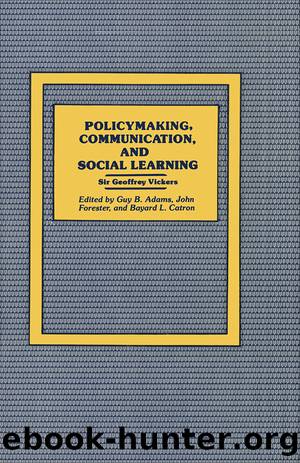Policymaking, Communication, and Social Learning by Geoffrey Vickers

Author:Geoffrey Vickers [Vickers, Geoffrey]
Language: eng
Format: epub
Tags: Social Science, Sociology, General
ISBN: 9781351317788
Google: SSFWDwAAQBAJ
Publisher: Routledge
Published: 2018-04-17T03:37:03+00:00
The Strangeness of Human Communication
Consider five of the outstanding oddities of human communication. First, men are capable of being communicated with and of being changed thereby. Let us forget for the moment the active aspect of communication. The obscurities, the possibilities and the limitations are best seen at the receiving end.
Second, we are not born with this capacity; and yet, if we do not develop it, we do not become recognizably human. This development is not simply an organic change. Although the brain and central nervous system develop, after as well as before birth, in ways which are necessary to full communicative power, the skills which they make possible can only be developed by using them. Biological development supplies the instrument but only human experience can supply a human program.
Third, these skills are extremely various. The newborn child, whose attention I cannot even attract, will be able, 10 to 15 years later, not only to understand nearly everything I say but also to derive from it much that I did not know I was conveying, including much about me, and very likely much that I had been careful not to say.
Fourth, these skills are partly tacit. Even the words we use arise from a level inaccessible to consciousness. Sometimes they surprise us. If on reflection we are dissatisfied with them, we can only invite our unconscious servants to submit some alternative for our approval. And conversely, our unconscious organization is affected by our conscious utterances. We are changed not only by being talked to but also by hearing ourselves talk to others, which is one way of talking to ourselves. More exactly, we are changed by making explicit what we suppose to have been awaiting expression a moment before.
Fifth, we know very little about how we carry on this extraordinary activity. We have not even a name for this state of affairs in our heads which is the fruit of past communication and which is both the target and the interpreter of present communication. This nameless state accounts for nearly everything which we and others doâand, more important, are. Our assumptions about it are basic to nearly all our explanations of the feelings, thoughts and doings of ourselves and our fellows. Its development has been the subject of educators since the earliest time when anyone consciously tried to teach a child. Nearly all our communication is directed to changing its state in others or in ourselves. It is strange that neither scientific nor common speech should have a word for it.
I have taken to calling it an appreciative system, because the word appreciation, as we use it when we speak of appreciating a situation, seems to me to carry with it those linked connotations of interest, discrimination and valuation which we bring to the exercise of judgment and which tacitly determine what we shall notice, how we shall discriminate situations from the general confusion of ongoing event, and how we shall regard them. I conceive it as consisting largely of categories for classifying and criteria for valuing experience.
Download
This site does not store any files on its server. We only index and link to content provided by other sites. Please contact the content providers to delete copyright contents if any and email us, we'll remove relevant links or contents immediately.
The Secret History by Donna Tartt(19089)
The Social Justice Warrior Handbook by Lisa De Pasquale(12190)
Thirteen Reasons Why by Jay Asher(8910)
This Is How You Lose Her by Junot Diaz(6887)
Weapons of Math Destruction by Cathy O'Neil(6281)
Zero to One by Peter Thiel(5802)
Beartown by Fredrik Backman(5754)
The Myth of the Strong Leader by Archie Brown(5508)
The Fire Next Time by James Baldwin(5446)
How Democracies Die by Steven Levitsky & Daniel Ziblatt(5219)
Promise Me, Dad by Joe Biden(5153)
Stone's Rules by Roger Stone(5088)
A Higher Loyalty: Truth, Lies, and Leadership by James Comey(4964)
100 Deadly Skills by Clint Emerson(4925)
Rise and Kill First by Ronen Bergman(4789)
Secrecy World by Jake Bernstein(4753)
The David Icke Guide to the Global Conspiracy (and how to end it) by David Icke(4720)
The Farm by Tom Rob Smith(4513)
The Doomsday Machine by Daniel Ellsberg(4490)
